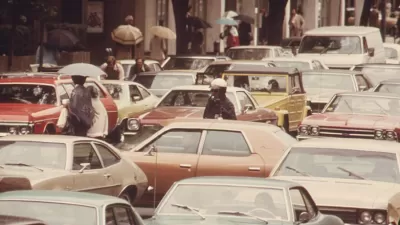It's not only young adults who are delaying in getting drivers licenses, but a drop in licenses among all age groups according to a new analysis of license data from 1983-2014 by the University of Michigan Transportation Research Institute.
"Car dealers may be coming off of their biggest sales year ever, but the future for the auto industry looks murkier as the percentage of Americans with a driver’s license continues to fall," writes Beth Braverman, contributing editor for The Fiscal Times.
Just 77 percent of Americans aged 16 to 44 held drivers licenses in 2014, down from 82 percent in 2008 and 92 percent in 1983. The percentage of Americans with driver’s licenses declined across every age group from 2011 to 2014, according to an analysis [PDF] by Michael Sivak and Brandon Schoettle at the University of Michigan Transportation Research Institute (UMTRI).
This is the second post showing a decline in young people getting drivers licenses, and the first showing that the decline is not restricted to younger drivers—both are based on UMTRI research.
Braverman offers several reason for the decline among age groups for getting licenses, including:
- a lack of interest among younger consumers in driving or owning a car,
- a general return to cities and close suburbs with reliable public transportation,
- the advent of ride-sharing services like ZipCar and on-demand taxis like Uber.
Autonomous for driverless cars will only hasten the decline according to some industry experts.
The decline in drivers licenses has contributed to the "aggregate number of miles driven plateau(ing) over the past decade, according to research from the Brookings Institute," adds Braverman, although recent trends point to reversing the decline in vehicle miles traveled in 2013 and 2014, even before gas began falling in price in July 2014 which accelerated after an OPEC meeting in November 2014.
What's bad news for the auto news is good news for the majority of adults who drive as it reduces congestion, notes Braverman.
The 2015 Urban Mobility Scorecard from the Texas A&M Transportation Institute found that drivers wasted more than 3 billion gallons of fuel and spent 7 billion extra hours sitting in traffic last year, at a cost of $160 billion, or $960 per commuter. [Note differing viewpoints on the scorecard.]
It may also lead to a reduction in crashes, not only because fewer people are driving, but because "(y)oung, inexperienced drivers, particularly 16- to 17-year-olds, are significantly over represented in fatal crashes," according to the National Highway Traffic Safety Administration (NHTSA).
However, there is one major exception to a possible reduction in crashes that can be inferred from the report. "The only age group to show a slight increase (in drivers licenses) since 2008 is the 70-and-older crowd," according to UMTRI.
"Older drivers have higher rates of fatal crashes, based on miles driven, than any other group except young drivers, according to the Insurance Institute for Highway Safety (IIHS)," notes the Insurance Information Institute in an article that presents more data on licensed drivers age 65 and older.
FULL STORY: This Is a Big Problem for the Auto Industry – and It’s Getting Worse

Montreal Mall to Become 6,000 Housing Units
Place Versailles will be transformed into a mixed-use complex over the next 25 years.

Planetizen Federal Action Tracker
A weekly monitor of how Trump’s orders and actions are impacting planners and planning in America.

DARTSpace Platform Streamlines Dallas TOD Application Process
The Dallas transit agency hopes a shorter permitting timeline will boost transit-oriented development around rail stations.

Without International Immigrants, the Rural US Population Would Be Falling 58%
Census data shows that population growth in rural areas is due in large part to international migrants.

Dead End: Nine Highways Ready for Retirement
The Freeways Without Futures report describes the nation’s most promising highway removal proposals.

Congressman Proposes Bill to Rename DC Metro “Trump Train”
The Make Autorail Great Again Act would withhold federal funding to the system until the Washington Metropolitan Area Transit Authority (WMATA), rebrands as the Washington Metropolitan Authority for Greater Access (WMAGA).
Urban Design for Planners 1: Software Tools
This six-course series explores essential urban design concepts using open source software and equips planners with the tools they need to participate fully in the urban design process.
Planning for Universal Design
Learn the tools for implementing Universal Design in planning regulations.
City of Mt Shasta
City of Camden Redevelopment Agency
City of Astoria
Transportation Research & Education Center (TREC) at Portland State University
City of Camden Redevelopment Agency
Municipality of Princeton (NJ)
Regional Transportation Commission of Southern Nevada




























